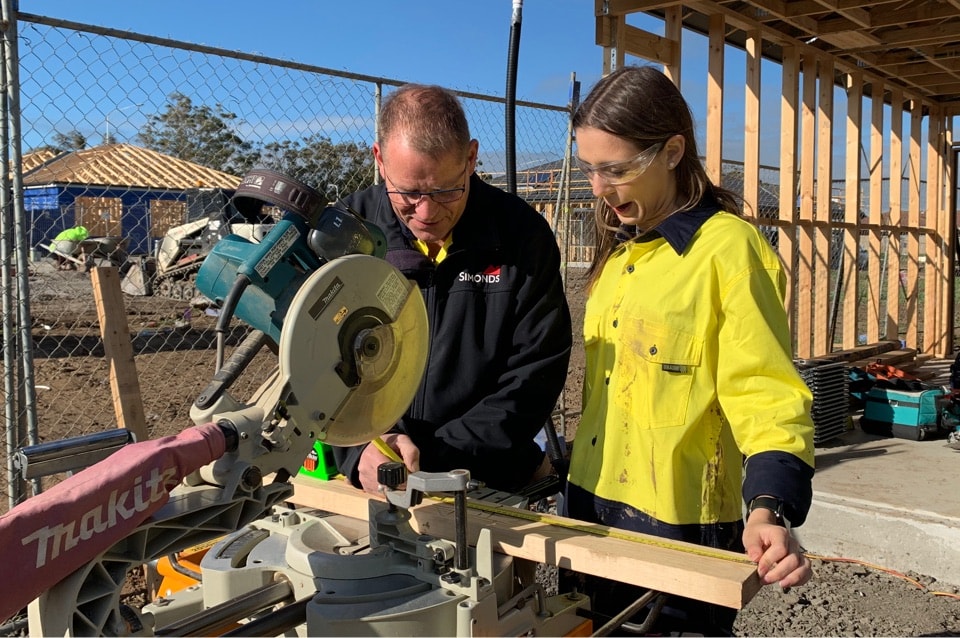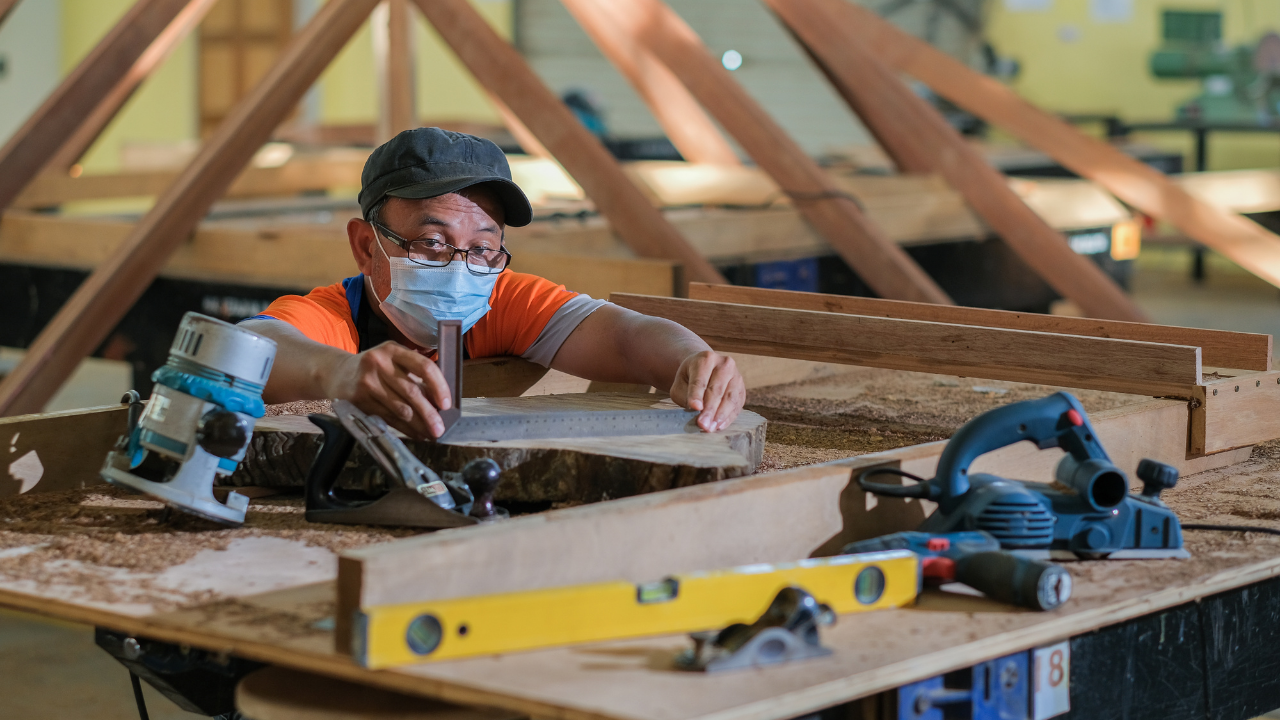Are you curious about what a carpentry apprentice does? Well, look no further! In this article, we’ll uncover the exciting world of carpentry apprenticeships and explore all the incredible things these apprentices get to do.
So, picture this: you’re a thirteen-year-old kid with a knack for building and creating things with your hands. Becoming a carpentry apprentice might just be the perfect fit for you.
Imagine working alongside experienced carpenters, learning the tricks of the trade, and getting hands-on experience in constructing everything from homes to furniture. As a carpentry apprentice, you’ll have the opportunity to develop valuable skills that can set you up for a rewarding career in the construction industry.
Sound cool? Well, get ready to dive into the world of carpentry apprenticeships and discover what it takes to become a skilled carpentry professional!

What Does a Carpentry Apprentice Do?
Welcome to the world of carpentry apprenticeship! If you’re curious about the role of a carpentry apprentice and what their day-to-day responsibilities entail, you’ve come to the right place. In this article, we’ll explore the diverse tasks and duties that carpentry apprentices engage in as they work alongside experienced carpenters, learn valuable skills, and contribute to various construction projects. Let’s dive in and discover the exciting work of a carpentry apprentice!
The Journey Begins: Becoming a Carpentry Apprentice
If you have an interest in carpentry and wish to pursue a career in this skilled trade, the first step is to become a carpentry apprentice. This entails finding an apprenticeship program through a trade union, vocational school, or construction company. Once accepted into the program, apprentices are typically required to complete a combination of classroom-based instruction and on-the-job training.
During the apprenticeship, carpentry apprentices learn the foundational skills and knowledge needed to become competent carpenters. They receive instruction in areas such as blueprint reading, building codes and regulations, tool usage and safety, woodwork, framing, finishing techniques, and more. This comprehensive training equips apprentices with the necessary skills to become successful in the field of carpentry.
1. Hands-On Experience: Assisting with Construction Projects
A significant part of a carpentry apprentice’s role is to assist experienced carpenters in construction projects. This hands-on experience allows apprentices to apply what they’ve learned in the classroom while gaining practical skills and knowledge. Apprentices work alongside their mentors, helping with various construction tasks such as measuring and cutting materials, assembling and installing structures, and ensuring that all work is precise and meets quality standards.
As apprentices become more experienced, they may be given more complex tasks and responsibilities. This gradual progression enables them to develop their skills and gradually take on larger projects with greater autonomy.
Throughout the apprenticeship, carpentry apprentices also learn to use a wide range of tools and machinery that are essential in carpentry work. They become proficient in using power tools, hand tools, and specialized equipment, ensuring their efficiency and safety on the job.
2. Constant Learning: Continual Skill Development
Carpentry is a field that requires continuous learning and skill development, and apprenticeships provide the perfect platform for this growth. Carpenters, both experienced and apprentices, must stay up-to-date with advancements in construction technology, building codes, and best practices.
During their apprenticeship, carpentry apprentices attend classroom sessions to learn about new techniques, safety guidelines, and developments in the industry. These classes are designed to supplement their on-the-job learning by providing a deeper understanding of carpentry principles and practices.
The learning doesn’t stop there. Carpentry apprentices are encouraged to seek learning opportunities outside of their apprenticeship program. They can participate in workshops, seminars, and industry events to stay ahead of the curve and explore new advancements in the field of carpentry.
3. Teamwork and Communication: Collaborating with Professionals
A carpentry apprentice works as part of a team, collaborating with experienced carpenters, contractors, and other professionals in the construction industry. Effective communication and teamwork are crucial in delivering quality work and completing projects on time.
Apprentices have the opportunity to observe and learn from experienced professionals, gaining valuable insights into teamwork dynamics and effective collaboration. They learn how to communicate clearly, follow instructions, and work cohesively with others to achieve common goals.
The collaborative nature of carpentry apprenticeship not only improves technical skills but also instills important qualities such as problem-solving, adaptability, and time management, which are valuable in all aspects of life.
4. Safety First: Adhering to Workplace Safety Standards
Workplace safety is of paramount importance in the field of carpentry. As apprentices gain practical experience, they learn to prioritize safety to create a secure working environment for themselves and others.
Carpentry apprentices receive training on identifying potential hazards, following safety protocols, and using personal protective equipment. They learn how to assess risks and implement safety measures to prevent accidents and injuries on construction sites.
By consistently incorporating safety practices into their workflow, apprentices cultivate a safety-conscious mindset and contribute to a culture of safety in the carpentry industry.
The Road to Success: Becoming a Skilled Carpenter
As a carpentry apprentice progresses through their apprenticeship program, they develop the necessary skills, knowledge, and experience to become a skilled and competent carpenter. Upon completion of the apprenticeship, graduates may pursue various career paths. Some may choose to work as employees for construction companies, while others may decide to start their own carpentry businesses.
Career Advancement and Specialization
Upon becoming a journeyman carpenter, which typically happens after several years of experience, individuals may choose to specialize in specific areas of carpentry. Specializations can include cabinet making, furniture crafting, finish carpentry, or commercial construction, to name a few. This allows carpenters to further refine their skills and become experts in their chosen niche.
The Legacy Continues: Mentorship and Passing on Knowledge
As experienced carpenters reach the later stages of their careers, many choose to mentor and pass on their knowledge to the next generation of carpentry apprentices. This mentorship ensures the continuity of the trade, preserving valuable skills and techniques for the future.
In conclusion, a carpentry apprentice embarks on a dynamic and fulfilling journey, learning and honing their skills in carpentry through a combination of practical experience and classroom instruction. By assisting with construction projects, continually developing their skills, collaborating with professionals, and prioritizing safety, a carpentry apprentice lays the foundation for success in the world of carpentry.
Key Takeaways: What Does a Carpentry Apprentice Do?
- A carpentry apprentice learns and trains under experienced carpenters.
- They assist in various carpentry tasks like measuring, cutting, and assembling materials.
- Carpentry apprentices help set up and maintain tools and equipment.
- They learn how to read blueprints and follow instructions for construction projects.
- Apprentices also gain knowledge in safety procedures and regulations in the carpentry trade.
Frequently Asked Questions
Welcome to our FAQ section where we answer some commonly asked questions about what a carpentry apprentice does. Whether you’re considering a career in carpentry or just curious about the role, we’ve got you covered. Read on to find out more!
1. What are the main responsibilities of a carpentry apprentice?
As a carpentry apprentice, your main responsibilities revolve around assisting and learning from experienced carpenters. This may include tasks such as measuring and cutting materials, assembling structures, operating power tools, and maintaining a clean and safe work environment. Additionally, you may be involved in reading blueprints, estimating materials needed, and troubleshooting any issues that arise during the construction process.
Throughout your apprenticeship, you’ll have the opportunity to develop your skills in various areas of carpentry, including framing, finishing, and cabinetry. By working alongside experienced professionals, you’ll gain hands-on experience and learn the tricks of the trade.
2. What qualifications do I need to become a carpentry apprentice?
Typically, to become a carpentry apprentice, you’ll need a high school diploma or equivalent. While formal education isn’t always required, it can help you stand out in a competitive job market. Some vocational schools and community colleges offer carpentry programs that provide a strong foundation of knowledge and skills.
In addition to education, having good math skills and physical stamina is important in carpentry. Being able to accurately measure, calculate dimensions, and lift heavy materials are essential for success in this field. It’s also beneficial to have a strong work ethic, attention to detail, and excellent problem-solving abilities.
3. How long does a carpentry apprenticeship usually last?
The length of a carpentry apprenticeship can vary depending on the program and the province or state in which you’re located. Typically, apprenticeships range from 2 to 4 years. During this time, you’ll complete a combination of on-the-job training with a qualified carpenter and technical training at a trade school or through an apprenticeship program.
Throughout the apprenticeship, you’ll progress through different levels, gaining more responsibility and advancing your skills. By the end of the program, you should have a comprehensive understanding of various carpentry techniques and be ready to work independently as a journeyman carpenter or continue your education in specialized areas.
4. What are the career prospects for carpentry apprentices?
The career prospects for carpentry apprentices are generally promising. Skilled carpenters are in demand for construction projects, renovations, and building maintenance. As an apprentice, you’ll have the opportunity to learn from veterans in the industry and gain invaluable experience that can open doors to future job opportunities.
With experience and further training, you can specialize in areas such as cabinetmaking, furniture making, or even pursue a managerial role in construction. There’s also the possibility of starting your own carpentry business, providing services to residential or commercial clients. The skills and knowledge acquired as a carpentry apprentice can lead to a fulfilling and financially rewarding career.
5. Can I continue my education after completing a carpentry apprenticeship?
Absolutely! Completing a carpentry apprenticeship is a solid foundation, but it doesn’t mean your learning journey has to end there. Many carpenters choose to continue their education by pursuing advanced certifications or diplomas in specialized areas such as architectural woodworking, building inspection, or project management.
Continuing education can enhance your skills, increase your earning potential, and open up more career opportunities. It’s important to stay updated on the latest techniques, technologies, and building codes to ensure you’re offering the best service to clients. Lifelong learning is key in a constantly evolving industry like carpentry.

Summary
Being a carpentry apprentice means learning and working alongside experienced carpenters to develop important skills in the trade. Carpenters build and repair structures, such as houses and furniture, using tools like saws and hammers. They measure and cut materials, and then use techniques like nailing and gluing to put them together. Apprentices also help with tasks like carrying materials and cleaning up the workspace. Through their apprenticeships, they gain valuable hands-on experience and knowledge that will set them up for a successful career in carpentry.
In addition to learning technical skills, apprentices also develop important qualities like teamwork, problem-solving, and attention to detail. They have the opportunity to work on various projects, which helps them gain versatility and a broader understanding of carpentry. With dedication and hard work, apprentices can progress in their careers and become skilled carpenters, with the potential to eventually start their own businesses. Carpentry apprenticeships are a great path for those interested in working with their hands and building things with precision and craftsmanship.
